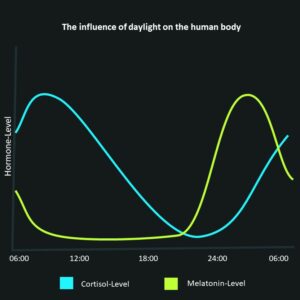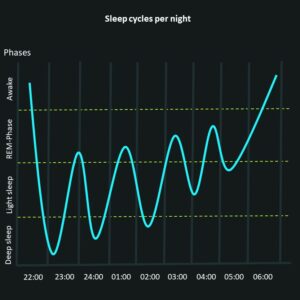We spend just under a third of our lives asleep. Meanwhile, various regeneration and repair processes take place in our body and mind. Accordingly, a sufficiently long and restful sleep is necessary. Because those who regularly sleep well and sufficiently are more physically and mentally efficient overall.
The most important circadian rhythm (= diurnal rhythm) in humans is the sleep-wake rhythm. This adapts to fixed external clocks (time of day or working hours) and can also change over the years. Normally, our “internal clock” controls this rhythm on the basis of the day-night-change. Hormones play a special role here in conjunction with light. The sleep process requires the hormone melatonin, which is predominantly active in the evening and at night. However, light controlls this hormone. A bright environment suppresses the production of the sleep hormone, which keeps us active and awake longer. The blue light from screens also has an influence on the suppression of melatonin production. During the day, the “wake-up hormone” cortisol drives melatonin out of the body. In addition to these hormones, many other messenger substances are involved in the sleep-wake rhythm. Nevertheless, external influences such as too much screen time, which can occur in eSports, can disturb this rhythm.

While we sleep, we might think from the outside that this is a monotonous state. But during sleep, humans go through various phases that occur in a fixed rhythm. In the phase of falling asleep, the body slowly comes to rest and breathing and the heartrate slow down. In addition, the muscles increasingly relax and the body temperature drops. This phase is a very light sleep and thus forms the transition between being awake and being asleep. We cannot remember the actual moment of falling asleep. Within a very short time, our brain releases chemical substances that switch off our consciousness. In the light sleep phase that thus occurs, all our muscles can relax. During the night, this sleep phase accounts for more than half of the total sleep time. The deep sleep phase represents the actual physical relaxation and mental recovery. During this phase, the body regenerates, cells are repaired, immune substances are increasingly produced and metabolic “waste” is disposed of. During the so-called REM sleep phase (“Rapid Eye Movement” = light sleep phase), most of the brain activity takes place. Information from long-term memory is retrieved, emotional sensory impressions are processed and memories are rearranged. For this reason, we dream in particular during this sleep phase. These phases repeat in regular sleep cycles. At the beginning, we have more deep sleep phases, but these decrease as sleep progresses and REM phases enter instead. As a result, the longer we sleep, the less deep our sleep becomes overall until we awaken.

If you do not get enough and restless sleep, you probably notice it by yourself in the morning. You do not get going well and your sense of well-being is reduced. However, this is completely normal if you do not sleep well for a night. It only becomes problematic when a permanent lack of sleep occurs. This leads to serious physical and mental problems. As a result, the immune system, among other things, does not have the opportunity to regenerate. Therefore, infections can occur more frequently. Moreover, in addition to persistent fatigue and exhaustion, mental and physical performance is severely impaired. This also has an impact on performance in eSports. For example, a lack of concentration can lead to attention deficits, making it almost impossible to achieve peak performance. Prolonged lack of sleep can even lead to depression or burnout, which is why you should maintain a certain “sleep hygiene”. The “hygiene” in this sense has nothing to do with cleanliness, but are tips and recommendations for a healthy and restful sleep.
The so-called blue light from computer screens or smartphones can contribute to this lack of sleep. This is because the blue components in the light from the devices suppress the production of the sleep hormone melatonin. The higher the blue components in the light, the more awake we stay. This also has an influence on our internal clock and thus on the sleep-wake rhythm. This not only makes it more difficult to fall asleep, but also restless sleep can be the result of too much screen time. Dry and exhausted eyes are an additional side effect of staring at the screen for too long. To prevent this, it is necessary to reduce screen time on both computers and smartphones, especially in the evening. In addition to switching on the night mode on the device itself, filter glasses are also suitable. Both methods filter out blue light. It is best to schedule an hour of screen-free time before going to bed. This way, you are no longer exposed to blue light and your body can better prepare for a restful sleep.
For a good and restful sleep, you can do a lot yourself. The bedroom plays an important role in this. It should be clear to everyone that brightness and noise disturb sleep. Accordingly, we recommend a dark and quiet bedroom. This also means that you should turn off the TV or similar to fall asleep. Room temperature and humidity have an equally strong influence on sleep. We recommend a temperature of about 18 degrees. In addition, open windows ensure good ventilation of the room during sleep. Otherwise, the room air condition could be too dry, causing the respiratory tract to dry out quickly and a cold to result.
But your own behavior can also help you sleep better. A routine with fixed sleeping times ensures a regular sleep rhythm. Sufficient and regular exercise during the day, preferably in the fresh air, has a particularly positive effect on sleep quality. However, you should avoid intensive physical exertion two hours before bedtime. Shortly before sleeping, it is best to rest and hardly engage in any physical activity. If necessary, it should be limited to a maximum of light physical activity. From the afternoon onwards, you should avoid wakefulness stimulants with caffeine content, such as coffee or energy drinks. Because even if you don’t consciously notice the effect of caffeine after a few hours, it is still active in your body and can prevent you from resting in the evening. If you follow these few tips, nothing will stand in the way of healthy sleep and you will be ready for the challenges of the day ahead.